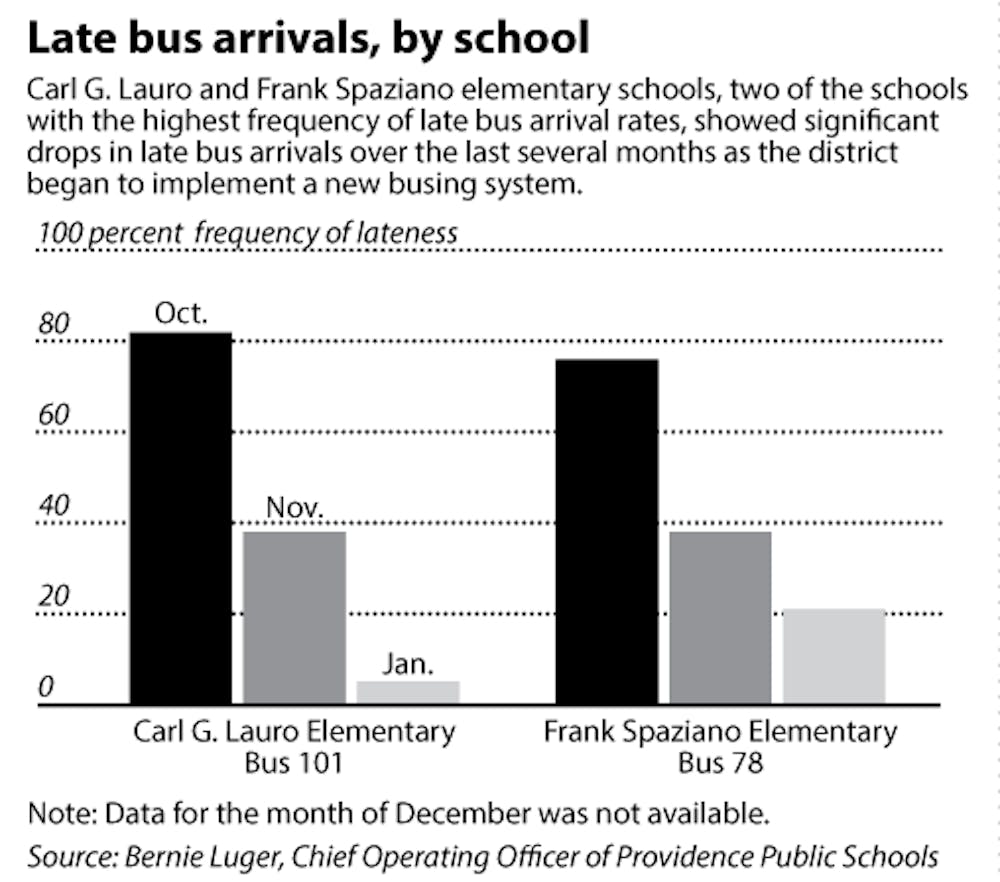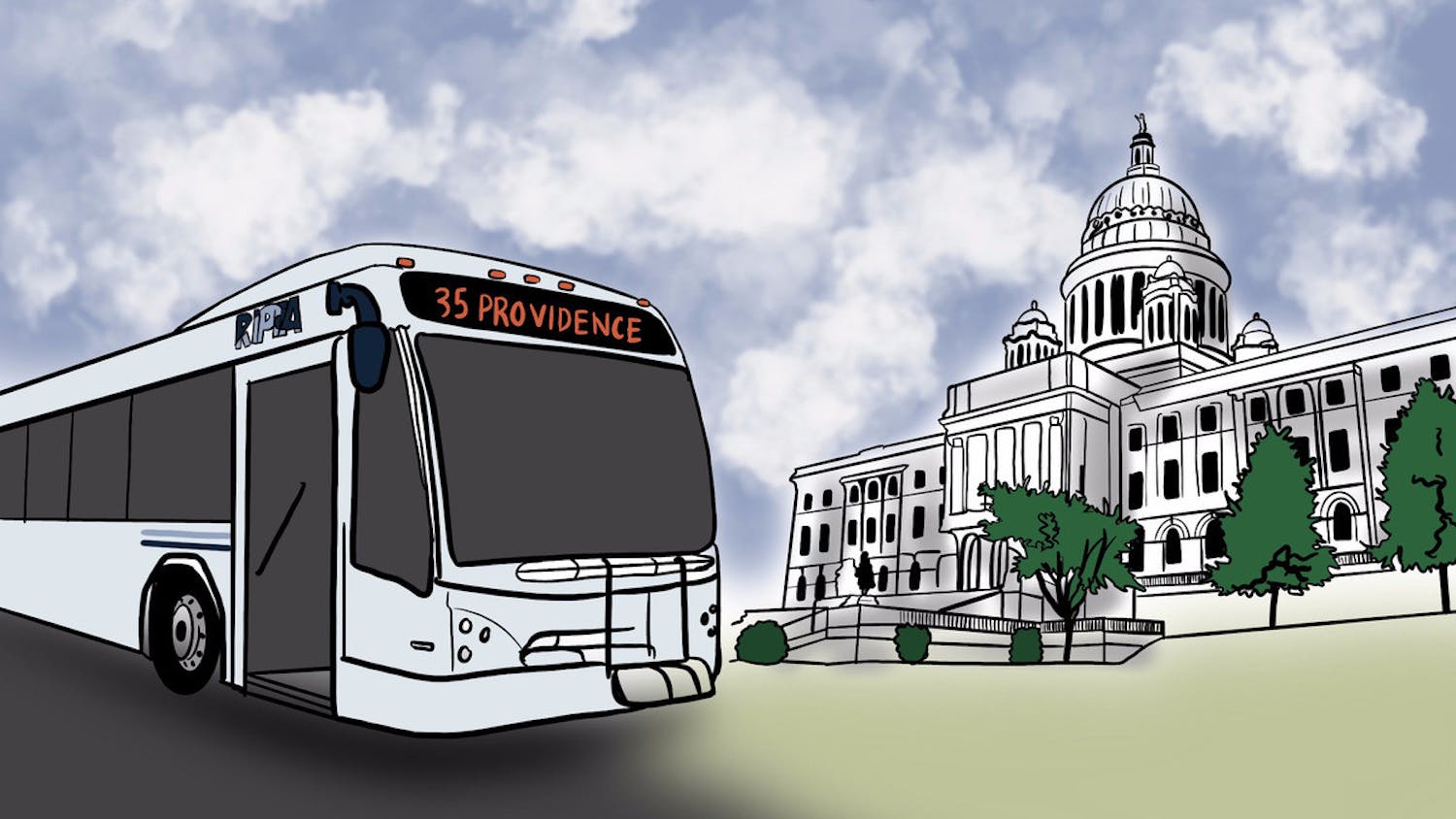Many parents of Providence Public School District students have expressed concerns over student transportation issues this year, pointing to scheduling adjustments and budget cuts as problematic for elementary through high school students trying to get to school before the morning bell.
The PPSD brought in a consultant fall of 2012 from Management Partnership Services, Inc., a student transportation consulting firm, who made recommendations on how to improve the district’s transportation system and minimize expenses for the 2013-14 school year. The recommendations included changing the elementary and middle schools’ start and dismissal times in order to optimize the number of buses needed from First Student, the bus company that contracts with the PPSD for elementary and middle school student transportation.
Though PPSD complied with the recommendation in cutting the number of school buses used in the district, it implemented different schedule adjustments than were recommended by the consultant.
High school students who live more than three miles away from their schools are issued a Rhode Island Public Transit Authority pass, and no changes to this policy were made as a result of the consultants’ recommendations.
Classical High School, Central High School, the Juanita Sanchez Educational Complex and Mount Pleasant High School now start 90 minutes late on Wednesdays to “allow teachers time to collaborate,” the Providence Journal reported.
Mark Binder, a parent of three students at Classical High School, wrote in a September letter to the editor to the Journal that the RIPTA bus that would normally carry students from the East Side to Classical was full by the time students on the East Side needed to board on Wednesdays, and other buses did not get the students to school on time. Some students who live within the three-mile radius of their high school also had problems getting to school. Another bus was added to the route a few days later to compensate for the problem.
Brett Smiley and Jorge Elorza, both candidates for mayor, have spoken out about this issue.
There is a strong correlation between cold weather and absenteeism in the Providence school district, Elorza said in a statement Feb. 2, pointing to the large minimum distance required for high school students to receive a free bus pass as a possible cause.
Christina O’Reilly, spokeswoman for the Providence School Department, said First Student bus transportation difficulties are likely not linked to attendance issues among elementary and middle school students, as high absentee rates in Providence have been historical, whereas the transportation issues are more recent.
PPSD is reconsidering its policy of issuing RIPTA bus passes only to students living outside a three mile radius of their schools, she added.
For the 2013-14 school year, the PPSD had decided to change the bell time structure of the elementary and middle schools so that many elementary schools start at the same time and all of the middle schools start at the same time. These changes were not made in response to the transportation consultant’s recommendations but were made to allow professional development and collaboration time for teachers, said Keith Oliveira, president of the Providence School Board.
Oliveira said because the bell time changes were made without considering the effects on student transportation, many school busing issues came up last fall. “I think it was a self-inflicted problem,” he added.
But the PPSD did implement cuts to the number of school buses in accordance with the consultant’s recommendation.
Michele Meek, a parent of a PPSD student, told The Herald the board “decided to cut over a dozen buses in the system and double up on some routes,” adding that the plan did not account for accurate transportation times.
Many bus drivers were given routes that took much longer to accomplish than the time allotted, which resulted in students arriving to school late, Meek said. “My daughter was late to school every day for the first few weeks of school,” she said. One bus was late to pick students up from school 94 percent of the time in October, according to First Student reports.
Meek pointed to several different factors contributing to this problem. She said that the school district created the transportation issues by rerouting the buses for this school year, but that they were acting within the budget constraints created by the mayor’s office.
“If there’s someone at fault here, I blame the mayor’s office” because they created budget cuts “that are not fair to the children of the city” without making “changes to their own internal system and incompetencies,” Meek said.
The tardiness of the buses has largely been resolved, O’Reilly said. Buses were late at much lower rates in January than they were in October or November, according to the PPSD reports.
But Meek emphasized the importance of continuing to improve the school transportation system.
“The unfortunate part is that the buses are the most minor issue in the PPSD … But if you can’t even get kids to school on time, you’re not really setting kids up to succeed,” she said.
A previous version of this article misrepresented a problematic RIPTA bus route identified by Mark Binder last fall. An additional bus was added to the route shortly after his Providence Journal letter to the editor in September, mitigating the transportation difficulties. A previous version of this article also misrepresented statements made by Christina O'Reilly. She said transportation problems were not linked to absenteeism specifically among elementary and middle school students, which was not a comment on high school students taking RIPTA buses.

ADVERTISEMENT




